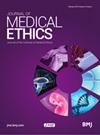When uncertainty is a symptom: intolerance of uncertainty in OCD and 'irrational' preferences.
IF 3.3
2区 哲学
Q1 ETHICS
引用次数: 1
Abstract
In ‘Patients, doctors and risk attitudes,’ Makins argues that, when physicians must decide for, or act on behalf of, their patients they should defer to patient risk attitudes for many of the same reasons they defer to patient values, although with a caveat: physicians should defer to the higherorder desires of patients when considering their risk attitudes. This modification of what Makins terms the ‘deference principle’ is primarily driven by potential counterexamples in which a patient has a firstorder desire with one risk attitude (either riskseeking or averse) and a secondorder desire that this risk attitude not be effective in guiding their choices. There are two reasons we might think people with obsessive–compulsive disorder (OCD) are particularly relevant patients for evaluating Makins’ proposal. Not only might their firstorder risk attitudes be irrational, but many people with OCD also judge their own OCD behaviours to be excessive or unwarranted making them structurally similar to the counterexamples outlined above. Yet, I argue that recent research about risk and decisionmaking under uncertainty for those with OCD complicates Makins’ proposal by raising questions of whether and to what degree their risk attitudes are irrational such that they should not play a part in the surrogate decisions made by physicians. This places more pressure on Makins to identify general criteria for when risk attitudes are problematically irrational as opposed to merely unusual.当不确定性是一种症状时:对强迫症的不确定性和“非理性”偏好的不容忍。
本文章由计算机程序翻译,如有差异,请以英文原文为准。
求助全文
约1分钟内获得全文
求助全文
来源期刊

Journal of Medical Ethics
医学-医学:伦理
CiteScore
7.80
自引率
9.80%
发文量
164
审稿时长
4-8 weeks
期刊介绍:
Journal of Medical Ethics is a leading international journal that reflects the whole field of medical ethics. The journal seeks to promote ethical reflection and conduct in scientific research and medical practice. It features articles on various ethical aspects of health care relevant to health care professionals, members of clinical ethics committees, medical ethics professionals, researchers and bioscientists, policy makers and patients.
Subscribers to the Journal of Medical Ethics also receive Medical Humanities journal at no extra cost.
JME is the official journal of the Institute of Medical Ethics.
 求助内容:
求助内容: 应助结果提醒方式:
应助结果提醒方式:


